Subtotal: $
Checkout-

Gustav Landauer
-

I Begin with a Little Girl’s Hair
-

Kochel: Waterfall I
-

Covering the Cover
-

Anabaptist Readings on Community of Goods
-

The Economics of Love
-

Readers Respond: Issue 21
-

Family and Friends Issue 21
-

The Bronx Agrarian
-

The McDonald's Test
-

What Lies Beyond Capitalism?
-

The Interim God
-

Robin Hood Economics
-

Is Christian Business an Oxymoron?
-

Not So Simple
-

Comrade Ruskin
-

What Are the Heart’s Necessities?
-

Exposed
-

Who Owns a River?
-

Editors Picks Issue 21
-

Working Girls

Was Martin Luther King a Socialist?
The iconic public philosopher has much to teach today’s radicals and visionaries, whatever their politics.
By Brandon M. Terry
August 5, 2022
Available languages: Español
Next Article:
Explore Other Articles:
This article was originally published in the Summer 2019 issue of Plough Quarterly.
As socialists in America today seek to rebuild a movement that has spent decades on the political margins, they understandably seek to anchor their mission in earlier freedom struggles. Of these, few have more to offer in moral authority and political significance than the civil rights movement and its foremost public philosopher, Martin Luther King Jr.
In left circles, accordingly, it’s become an increasingly familiar (and welcome) gesture to remind audiences of King’s “radicalism,” pushing back against his portrayal as an anodyne consensus figure. Too often, though, King’s indictments of racism, militarism, and materialism are recited as a rote catechism; the full breadth of his vision goes forgotten. This is a shame, and a lost opportunity. There is much in King’s legacy of public philosophy from which all sides might learn – the socialists who lay claim to him, and also their opponents.
A Secret Red?
Until recently, the question of King’s radicalism remained mostly the province of a handful of scholars and of the Christian left. While this spelled a loss in terms of intellectual history, ironically it also represented a victory of sorts: it marked the end of a Cold War–era skirmish over whether King was a socialist subversive, possibly even a full-blown “Red” who colluded with the Soviet Union.
In the wake of King’s assassination, the détente regarding his alleged socialism allowed him to enter the pantheon of American heroes and be ritually celebrated by the state. But the cost of King’s canonization was steep, resulting in a narrowed understanding of his ideals and those of the broader civil rights movement.
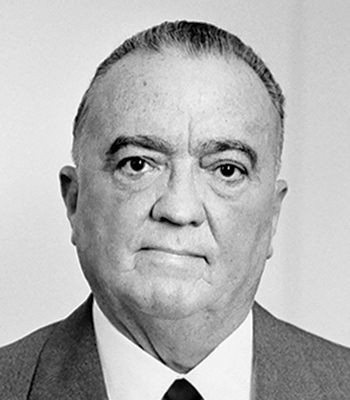
J. Edgar Hoover
During King’s lifetime, his alleged socialism was an obsession within the American security state, fueled by J. Edgar Hoover, director of the Federal Bureau of Investigation. Hoover, an implacable foe of black political agitation, also used the FBI to undermine figures such as Marcus Garvey, Claudia Jones, W. E. B. Du Bois, and Paul Robeson. The director, admittedly, did not conjure his suspicions about King and communism from thin air. As early as the Montgomery bus boycott (1955–56), King surrounded himself with advisors who had cut their teeth in leftist circles, such as the openly gay socialist and peace activist Bayard Rustin. Worse, from Hoover’s point of view, King relied heavily on the fundraising prowess, speechwriting acumen, and intellectual companionship of Stanley Levison, who, as the FBI “warned” King, was also a prolific fundraiser for the Communist Party of the United States of America (CPUSA). That King did not distance himself from Levison at the FBI’s behest left Hoover incensed.
Hoover’s insistence that King was a communist, or at least a communist dupe, served to justify subjecting him to illegal surveillance, sabotage, and harassment, with the approval of both the Kennedy and Johnson administrations. When field agents reported no clear-cut evidence of King’s communism, Hoover ordered them to look harder. As good bureaucrats, they duly manufactured the desired results. After being berated by Hoover, William C. Sullivan, the head of the Domestic Intelligence Division, delivered this infamous assessment of the 1963 March on Washington: “I believe in the light of King’s powerful demagogic speech yesterday he stands head and shoulders over all other Negro leaders put together when it comes to influencing great masses of Negroes. We must mark him now, if we have not done so before, as the most dangerous Negro of the future in this Nation from the standpoint of communism, the Negro and national security.”
The irony is that, in the end, King likely made more impact on Levison and the communist movement than vice versa. While the FBI could not imagine black intellectuals influencing white ones, it seems that the closer Levison grew to King, the more disillusioned he became with official communism and the CPUSA. King and the surging civil rights revolution became the locus of his hopes for the politics of emancipation.
Though the FBI’s surveillance of King had been initiated as an anti-communist measure, it also reflected Hoover’s conviction that King was a moral hypocrite and a sexual “degenerate.” Indeed, the FBI investigation came to focus so incessantly on sex that this may be its most lasting legacy. Recent allegations by the journalist David Garrow, drawing on declassified FBI memos, charge that King’s indefensible sexism – which I have written about at length elsewhere with the feminist theorist Shatema Threadcraftfootnote – had more disturbing manifestations than previously known. Yet, as historians like Barbara Ransby have argued, accounts like Garrow’s, which rely heavily upon unsourced, unverified, and anonymous FBI agent notations, must be taken with “healthy skepticism.” Not only was the FBI often simply inept, but its director and his staff shared a clear mission: to destroy black radicalism.
But was King a “radical” in the socialist sense? Jesse Helms, the legendarily racist North Carolina Republican, certainly thought so. In 1983, during the debate to establish a federal holiday in King’s memory, Helms denounced him on the Senate floor as an adherent to the “official policy of communism” and “action-oriented Marxism.” Helms’s words were widely denounced by his Senate colleagues, but President Ronald Reagan’s reaction was more oblique. Asked if he thought King had been a communist sympathizer, the president referred to the eventual declassification of the FBI’s secret recordings: “Well, we’ll know in about thirty-five years, won’t we?”
A Contentious Legacy
Thirty-five years have passed since Reagan said those words, yet debate over King’s socialism still turns a great deal on comments delivered in private and relayed through archival records or secondhand interviews. Among the most cited are off-the-record statements that King delivered at gatherings of the Southern Christian Leadership Conference (SCLC) toward the end of his life. At a 1966 retreat in South Carolina, for example, King insisted that “something is wrong with capitalism,” championed Scandinavian forms of social democracy, and argued that there must be “a move toward a democratic socialism.” In his 1967 annual address to the SCLC, King declared that the civil rights movement needed to “address itself to the question of restructuring the whole of American society.” For King, the fact that an affluent society had forty million citizens in poverty meant not simply “raising a question about the economic system, about a broader distribution of wealth,” but turning to “question the capitalistic economy,” the ownership of capital, and the failure of markets to meet vital needs. Perhaps most famously, William Rutherford, an SCLC ally, reported that King privately told him, “Obviously we’ve got to have some form of socialism, but America’s not ready to hear it yet.”
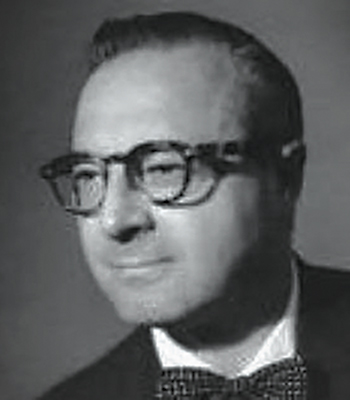
Stanley Levison
Such statements seem to buttress the claim that King became more radical in his later years. Yet there is evidence of continuity in King’s views on economic justice dating back to the late 1940s. In undated seminary writings from that period, King predicted that “capitalism has seen its best days in America, and not only in America, but in the entire world…. it has failed to meet the needs of the masses.” In a 1952 love letter to Coretta Scott, King wrote that “I am much more socialistic in my economic theory than capitalistic,” and later, “I would certainly welcome the day to come when there will be a nationalization of industry.”
There are, however, two major difficulties with relying upon such statements to adjudicate King’s “socialism.” The first is that King never articulated them in his published writings, despite a career of careful, considered, and courageous statements on an astonishing range of issues. The second is that these statements contain few specifics fleshing out their relationship to traditional conceptions of socialism, including the abolition of private property or wage labor. In 1967, for example, King demanded that we ask “Who owns the oil?” or “Who owns the iron ore?” but he did not then suggest collective ownership of natural resources or utilities. It is difficult, therefore, to know what would separate King’s views from those of liberals such as John Rawls, who argued for the massive redistribution of income and assets and lamented the outsized influence of profit motives and concentrated wealth in capitalist societies. Even if those who call King socialist were clearer about what they thought “socialism” entailed beyond egalitarian distribution and concern for capitalism’s corrosive cultural effects, King’s statements are not consistent or straightforward enough to be conclusive. We cannot establish him as a committed socialist; we also cannot prove that he wasn’t one.
The Radical King Is Back
This lack of decisive evidence, however, hasn’t discouraged interest in King-as-socialist. His name figures prominently in contemporary socialist writing, from Martin Hägglund’s This Life, a new exploration of the philosophical foundations of democratic socialism, to Keeanga-Yamahtta Taylor’s From #BlackLivesMatter to Black Liberation and Bhaskar Sunkara’s The Socialist Manifesto. Leftist publications such as Jacobin and In These Times have solicited rafts of articles dedicated to King’s place in socialist history. The self-described socialist senator and presidential candidate Bernie Sanders has especially channeled King’s iconography, naming his most recent book Where We Go From Here after King’s 1967 manifesto.
King thought capitalism was “like a losing football team in the last quarter trying all types of tactics to survive.”
For twenty-first-century socialists in the United States, invoking King serves two obvious needs. First, King combines a blistering critique of racism – including racism within the left – with an unapologetically left-wing vision of economic justice. King never minces words on the role of racism in American inequality, but he also doesn’t make the mistake of reducing all black disadvantage to racial discrimination, instead foregrounding broader factors of economic transformation and public policy. This provides him with a critique of black nationalism that is useful for contemporary leftists critical of so-called “identity politics.” His thoughts on this in Where Do We Go From Here: Chaos or Community? (1967) are worth quoting at length:
Just as the Negro cannot achieve political power in isolation, neither can he gain economic power through separatism. While there must be a continued emphasis on the need for blacks to pool their economic resources and withdraw consumer support from discriminating firms, we must not be oblivious to the fact that the larger economic problems confronting the Negro community will only be solved by federal programs involving billions of dollars. One unfortunate thing about Black Power is that it gives priority to race precisely at a time when the impact of automation and other forces have made the economic question fundamental for blacks and whites alike…. In short, the Negroes’ problem cannot be solved unless the whole of American society takes a new turn toward greater economic justice.
Second, King provides a powerful rejoinder to those voices that have successfully demonized socialists as anti-American and contemptuous of religious faith. Unlike this conservative caricature, King developed his most radically egalitarian and politically militant arguments with a reliance on Christian scripture and the Declaration of Independence. In the 1965 sermon “The American Dream,” for example, King offers his take on American exceptionalism, proclaiming that “God somehow called America to do a special job for mankind and the world.” This task, he says, demands that we uproot not only racism, but also the “class system,” which “can be as vicious and evil as a system based on racial injustice.”
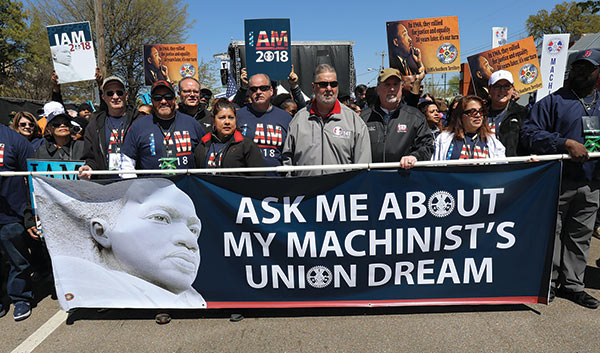
Workers march in Memphis on the 50-year anniversary of Martin Luther King Jr.’s assassination, April 2018. Photograph from iamaw463.com
Invoking King can be tricky, however, as Senator Sanders recently discovered. At the “She the People” Presidential Forum in Houston in April 2019, he was booed by black women for this innocuous-sounding answer to a question about combating the surge in white supremacist violence: “I was actually at the March on Washington with Dr. King back in 1963, and – as somebody who actively supported Jesse Jackson’s campaign, as one of the few white elected officials to do so in ’88 – I have dedicated my life to the fight against racism and sexism and discrimination of all forms.” There were many factors at work in the audience’s reaction, but surely some of it was a sense that Sanders’s attempt to link his socialism with King smacked of political opportunism.
Grassroots Democracy
To move beyond cynicism and confusion, it might be best to stop asking whether King was a socialist, and instead ask what King the public philosopher can teach socialists today. Two elements of King’s thought seem especially important for contemporary controversies around socialism: one, his conception of democracy, and two, his demand for a “radical revolution of values.”
It is striking how quickly contemporary discussions of “democratic” socialism gloss over democratic practice to focus on redistributive public policy. In doing so, they often reduce the involvement of ordinary citizens to voting and contributing to electoral campaigns. Sanders’s interest in democratic socialism, for example, primarily seems to be about the method of redistribution (via electoral politics) and a sense that concentrated wealth unfairly devalues democratic citizenship.
Although King is known as a voting rights activist, his wider thinking on democracy is neglected. His most original reflections lay less in the sphere of formal electoral politics than in spheres of democratic action. King saw mass meetings, public arbitration, boycotts, civil disobedience, and civic association as ways to deepen and reinvigorate democratic society, above and beyond voting and legislation. Recounting the failure of Reconstruction to deliver multiracial democracy, King consistently warned that civil rights must not be treated as permanent achievements but as perpetually vulnerable goods that need to be defended and deepened by vigilant citizen action such as boycott, protest, and civil disobedience.
One goal of state policy, King thought, should be to expand the spaces in which citizens come together to exchange ideas and resist exploitation and domination. For example, while King defended a guaranteed annual income for citizens on the grounds that it respected the dignity of persons, he also thought it might play a powerful role in fostering democratic action. A guaranteed income would allow people to resist domination by employers, bureaucrats, and landlords. Having watched defenders of the status quo in the South punitively and illegally deny employment or welfare benefits to African American activists, King forcefully objected to “uncontrolled bureaucratic or political power” across the full sweep of social life.
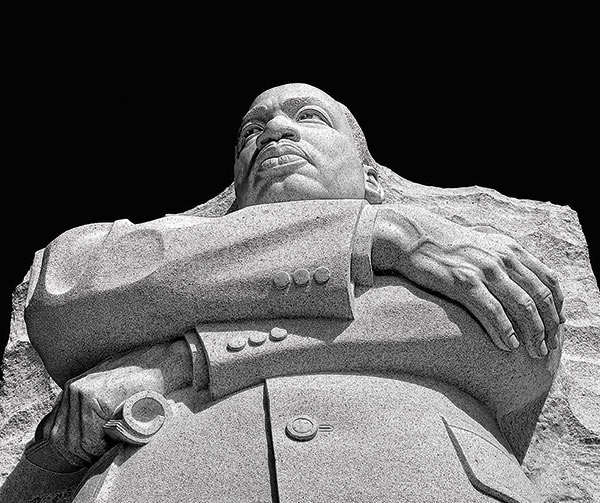
Photograph by Ricardo Gomez Angel. Used with permission.
To resist such power, King explicitly championed forms of collective organization such as welfare and tenants’ unions, local arbitration boards, and school and transportation boards. In 1967, King described these as “new methods of participation in decision-making” that could bring about a truly integrated society, where power is shared justly. Such organizations require the participation of the disadvantaged themselves in order to adequately recognize their dignity and respond to their needs and perspectives, and to punish arbitrary bureaucratic humiliation and overreach.
Such ideals, King thought, could never be achieved within the boundaries of formal politics alone. They must always be supplemented by traditions of protest and by sustained civic participation. King’s insistence on this is an important contribution toward what the German philosopher Axel Honneth treats as a defining aim of socialism: “a general structure of democratic participation” across the spheres of social life. This concept of distributed democratic power is fundamentally at odds with any socialism that relies on top-down, technocratic policymakers and bureaucracies to pursue its aims. King’s vision does not simply seek to “break up the banks.” It treats enhancing collective decision-making across the gamut of major institutions as a moral and political imperative.
A Revolution in Values
Crucially, genuine democratic participation across society would also require what King called “a radical revolution in values.” American capitalism, King warned, is shot through with racism, materialism, and militarism in ways that have become structural. “A nation that will keep people in slavery for 244 years,” King proclaimed in 1967, “will ‘thingify’ them and make them things. And therefore, they will exploit them…. And a nation that will exploit economically will have to have foreign investments and everything else, and it will have to use its military might to protect them. All of these problems are tied together.”
Put more sharply, King’s argument treats American capitalism’s valuations as fundamentally irrational, self-undermining, and dangerous. They lead to war-making and rapacious profiteering, the unjust and irrational allocation of social wealth and power, and the treatment of people – especially poor and racially stigmatized workers – as things. As such, these precarious members of the political community have their fate determined by considerations of market efficiency rather than moral equality.
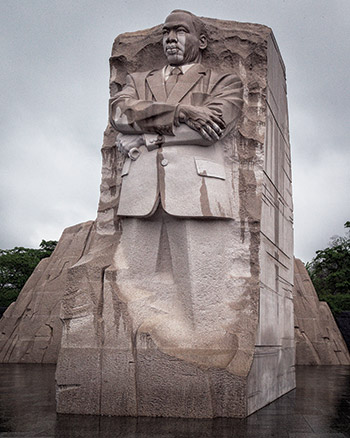
The Martin Luther King, Jr. Memorial in Washington, DC. Photograph by Mobilus in Mobili
Fundamentally, however, this revolution in values needed to be justified by democracy. “If democracy,” King stated, “is to have breadth of meaning it is necessary to adjust this inequity.” King’s way of framing these questions made it plain to his audience that the values of the existing economic order were not natural or inevitable but, as W.E.B. Du Bois put it in 1920, “strictly controlled” and “not matters of free discussion and determination.” Du Bois imagined supplanting American oligarchy with the “free discussion and open determination of the rules of work and wealth and wages.” Real democracy, he claimed, would place the “scientific and ethical boundaries of our industrial activities…. in the control of the public whose welfare such decisions guide.” King echoed such a vision when he challenged “a system that has created miracles of production and technology to create justice.”
For King, no principle emergent from capitalism or liberalism could possibly justify the obscenity of endemic poverty alongside extravagant wealth and technological achievement. King condemned such an order, in which the political economy imposes deprivation and degradation upon citizens even in the midst of affluence, as one “as cruel and blind as the practice of cannibalism at the dawn of civilization.”
King’s stridency on this point is instructive. For all of the ambition of the Green New Deal or of proposals for universal health and child care, it’s striking how tied up they still are with the imagination of middle-class strivings. By the end of his life, King had gone far beyond such Great Society measures to instead declare that “the time has come for us to civilize ourselves by the total, direct, and immediate abolition of poverty.” King’s call to end poverty (and abolish slums) is a challenge even to self-professed democratic socialists today, insofar as it entails confronting the deep historical and racial causes of wealth inequality and rethinking the existing legal order on matters from labor rights to metropolitan boundaries. The sweeping changes these goals demand explain why King used the language of “revolution,” whether he intended the word to have a socialist meaning or not.
We must pose fundamental questions about what, and whom, we value.
In seminary in 1951, King thought capitalism was “like a losing football team in the last quarter trying all types of tactics to survive.” “What will the new movement be called in America?” he wondered, suggesting that the aftermath of capitalism might go by “socialism, communism, or socialistic democracy.” In the end, however, such terms did not matter much: “the point is that we will have a definite change.”
Almost seventy years later, such confidence in a transformed future sounds unfamiliar, as if in a foreign tongue. Today we still live in a nation that, as King said in 1967, is “gorged on money while millions of its citizens are denied a good education, adequate health services, decent housing, meaningful employment, and even respect.” If we want to achieve the “radical revolution in values” that King described, we must move beyond symbolic anti-racism and the rhetoric of radicalism. Taking King’s example seriously would license us to dream at a scale worthy of the catastrophic challenges we face, and perhaps even to imagine a society which – from the vantage of today’s disinherited – truly deserves the name “democracy.”
Footnotes
- Shatema Threadcraft and Brandon M. Terry, “Gender Trouble: Manhood, Inclusion, and Justice” in Tommie Shelby and Brandon M. Terry, eds., To Shape a New World: Essays on the Political Philosophy of Martin Luther King, Jr. (Cambridge, MA: Harvard University Press, 2018).
Already a subscriber? Sign in
Try 3 months of unlimited access. Start your FREE TRIAL today. Cancel anytime.
































Mark Musetti
Thank you for giving me pause to reconsider socialistic democracy. King's mission statements on race relations and reducing socioeconomic inequality expose the greater problem with Sanders' movement, that such a system is still plutocratic at the top and is more concerned with fund-raising than with results earned from grass-roots demonstrations. I had a different take on your assertion of capitalism as it pertains to a football team. I see it as one who is winning late in the game and must wear the opposing team (any other economic structure) down by any means necessary, such as committing personal fouls when the referees (congressional sympathizers) aren't looking, all while the fans, fully aware, are helpless to change the outcome.
Red Robbo
Baptist minister King had apparently read some of Marx’s writings and did not like his materialism, but such influences can be seen here: ‘the profit motive, when it is the sole basis of an economic system, encourages a cutthroat competition and selfish ambition that inspires men to be making a living than making a life.’ He even stated ‘the fact is that capitalism was built on the exploitation and suffering of black slaves and continues to thrive on the exploitation of the poor – both black and white, both here and abroad,’ yet rather than seeking to replace capitalism with socialism he campaigned for reforms to restructure it – e.g. he strived for a universal basic income as well as end to ‘overpopulation’. Days after his death Congress passed the Fair Housing Act, which prohibited discrimination in housing basis of race, religion, or national origin. Decades later, Obama’s ‘change’ meant business as usual. Today, racism is waxing not waning, 40 million Americans live in poverty, the top 1 percent has more wealth than the bottom 90 percent, and ‘just 1 in 10 black Americans believe civil rights movement’s goals have been achieved in the 50 years since Martin Luther King Jr was killed’ (theindependent.co.uk, 31 March, 2018). And this, from Taylor Branch, the Pulitzer winning historian, says it all (probably unwittingly) : ‘all the issues that he raised toward the end of his life are as contemporary now as they were then’ (nytimes.com, 4 April), 2018. Dr. King focused famously on the ‘Triple Evils’ of poverty, racism and militarism, i.e., symptoms rather than the underlying disease.